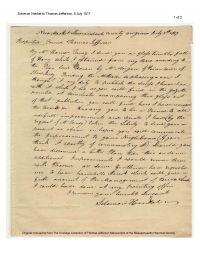 Throughout his retirement Thomas Jefferson received gifts of agricultural samples and writings due to his well-known interest in agricultural improvements and domestic manufacturing. The letter below concerned itself with beekeeping and was accompanied by a tumblerful of honey. The newspaper article enclosed with the letter described the practice of placing hive boxes side by side, with aligned openings at the top and bottom of each box. In order to avoid disturbing the bees, the article's author advocated waiting until the bees clustered in one of the boxes for warmth in the winter. Honey could then be easily taken from the adjacent boxes. A similar method of beekeeping may have been used at Monticello. This principle of hive design was described by the British clergyman Stephen White in his Collateral Bee-Boxes, Or, a New, Easy, and Advantageous Method of Managing Bees (London, 1759), an edition of which Jefferson owned.
Throughout his retirement Thomas Jefferson received gifts of agricultural samples and writings due to his well-known interest in agricultural improvements and domestic manufacturing. The letter below concerned itself with beekeeping and was accompanied by a tumblerful of honey. The newspaper article enclosed with the letter described the practice of placing hive boxes side by side, with aligned openings at the top and bottom of each box. In order to avoid disturbing the bees, the article's author advocated waiting until the bees clustered in one of the boxes for warmth in the winter. Honey could then be easily taken from the adjacent boxes. A similar method of beekeeping may have been used at Monticello. This principle of hive design was described by the British clergyman Stephen White in his Collateral Bee-Boxes, Or, a New, Easy, and Advantageous Method of Managing Bees (London, 1759), an edition of which Jefferson owned.
By Mr Thomas Tausy I Send you a glass tumbler full of Hony which I obtained from my Bees according to the Plan laid down by Mr Morgan of Prince Town of New Jersy. Finding the Methode so pleasing a one I thought it my duty to publish the Success I have had with it which I did as you will find in the gazette printed at Winchester accompaning this glass out of that publication you will find how I have managed the Boxes &c. Knowing you to be a Friend to all usefull improvements and Scients I have (by the request of Mr Tausy) taken the Liberty to Send you a present as above in hopes you will comunicate the Improvement to your Neighbours. (If you think it worthy of comunicating). Should you have discovered a better Plan then this or Some additional Improvements I would receive them with Pleasure as Some Gentlemen have requested me to have handbills Struck which will give a full account of the Management of Bees &c which I could have done at my printing office.
I remain your humble Servant
RC (MHi); endorsed by TJ as received 5 Oct. 1817 and so recorded in SJL. Enclosed in Alexander Garrett to TJ, 5 Oct. 1817.
Solomon Henkel (1777–1847), physician, pharmacist, and printer, studied medicine in Philadelphia before returning to Virginia in 1793 and later opening a drugstore in New Market. He expanded his business to sell books, and in 1806 his family started a prolific printing business in New Market that specialized in German-language and Lutheran texts and operated a weekly German newspaper. Henkel took over the press in 1814. He served as postmaster of New Market, 1801–14, and he practiced medicine in addition to his work as a printer (Charles W. Cassell, William J. Finck, and Elon O. Henkel, eds., History of The Lutheran Church in Virginia and East Tennessee [1930], 14, 309–12; Albert Sydney Edmonds, “The Henkels, Early Printers in New Market, Virginia, with a Bibliography,” WMQ, 2d ser., 18 [1938]: 174–95; Brigham, American Newspapers, 2:1122; Axelson, Virginia Postmasters, 173; DNA: RG 29, CS, Shenandoah Co., 1810–40; American Medical Reporter 1 [1818]: 398–9; Cultivator 8 [1841]: 97; American Farmer, and Spirit of the Agricultural Journals of the Day, new ser., 6 [1844]: 109; ViU: Henkel-Miller Family Papers; Vi: Henkel Family Papers; Shenandoah Co. Will Book, Y:184–9; gravestone in Emmanuel Lutheran Church Cemetery, New Market).
Henkel’s enclosed piece from an unidentified issue of the Winchester gazette was reprinted in the Alexandria Gazette & Daily Advertiser, 19 July 1817. It included instructions from an encyclopedia article written by George Morgan of Princeton, New Jersey, on how to extract honey from a hive without harming the bees, along with Henkel’s 6 June 1816 covering letter and his own observations on the method (Anthony F. M. Willich, The Domestic Encyclopædia; or, A Dictionary of Facts, and Useful Knowledge, ed. James Mease [Philadelphia, 1803–04], 1:239–40).
COPYRIGHT NOTICE: Published by Princeton University Press and copyrighted, ©, by Princeton University Press. All rights reserved. No part of this book may be reproduced in any form by any electronic or mechanical means (including photocopying, recording, or information storage and retrieval) without permission in writing from the publisher, except for reading and browsing via the World Wide Web. Users are not permitted to mount this file on any network server.
